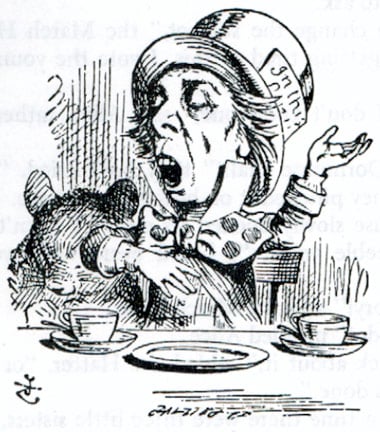/PAlogo_v2.gif) |
|
Post Reply 
|
Page 123 5> |
| Author | ||
richardh 
Prog Reviewer 

Joined: February 18 2004 Location: United Kingdom Status: Offline Points: 26171 |
 Topic: Keith Emerson and music theory Topic: Keith Emerson and music theoryPosted: February 01 2012 at 16:07 |
|
|
A weird thread really. It needs to lay down and die peacfully.
|
||
 |
||
The_Jester 
Forum Senior Member 

Joined: September 29 2010 Status: Offline Points: 741 |
 Posted: January 30 2012 at 16:59 Posted: January 30 2012 at 16:59 |
|
|
You were not trolled. You gave me your opinion and that's fine. Because of your arguments (wich were certainly not bad) you made me reflect on some aspects I could never think about. My opinion changed a bit because I had reflexions on the subject. Evolution is certainly not a bad thing. If you don't like me changing the post, I'll take it back to it's original form. This is a subject on wich I reflected and it is distateful I agree. |
||
|
La victoire est éphémère mais la gloire est éternelle!
- Napoléon Bonaparte |
||
 |
||
Dean 
Special Collaborator 

Retired Admin and Amateur Layabout Joined: May 13 2007 Location: Europe Status: Offline Points: 37575 |
 Posted: January 30 2012 at 16:49 Posted: January 30 2012 at 16:49 |
|
I will try and excuse the tone and phrasing of your post as English is not your first language, though I am finding that a little difficult since it makes the whole thread look like trolling to me and I find that inexcusable. Also editing the OP after 80 posts have been made in reply to it I also find distasteful. I suggest that is something you reflect on.
|
||
|
What?
|
||
 |
||
The_Jester 
Forum Senior Member 

Joined: September 29 2010 Status: Offline Points: 741 |
 Posted: January 30 2012 at 15:49 Posted: January 30 2012 at 15:49 |
|
I really like the 4ths and the riff in Tarkus is amazing. My point is that his solo doesn't stick to the form of the song and that it is not logical. It sure creates dissonance but I think it is unwanted. I too like dissonance in a lot of things (free jazz, contemporary classic, progressive rock, etc.) but I think that his solo is not supposed to be as dissonant as that.
|
||
|
La victoire est éphémère mais la gloire est éternelle!
- Napoléon Bonaparte |
||
 |
||
The_Jester 
Forum Senior Member 

Joined: September 29 2010 Status: Offline Points: 741 |
 Posted: January 30 2012 at 15:39 Posted: January 30 2012 at 15:39 |
|
You're right about the fact that we can't prove if one or the other says right and it was actually my fun of finding a subject on wich nobody could respond exactly but try to convince the others to their opinion. I searched on the web and I can't find out if he studied in music so maybe you could help me find the info. I'll edit my topic since my opinion slightly changed. I must admit that musical rules are not golden rules but what I wanted you to reflect on in the first place is that you should check on yourself before pointing others. The only thing I wanted to point out is that I think that Keith Emerson's solo isn't logical if we stick to the chord change and could be a lot better to my ears.
|
||
|
La victoire est éphémère mais la gloire est éternelle!
- Napoléon Bonaparte |
||
 |
||
Gerinski 
Prog Reviewer 

Joined: February 10 2010 Location: Barcelona Spain Status: Offline Points: 5093 |
 Posted: January 30 2012 at 14:13 Posted: January 30 2012 at 14:13 |
|
|
Dean, the re-post of the 2008 post by Trademark was nice.
I think in the end it's just all those 4ths which are confusing The Jester, many people are so used to the most common intervals of 3rds and 5ths that can not get the 4ths, that's too bad.
Tarkus and many other songs by ELP have been covered by an endless number of musicians, ELP have toured with an orchestra.... if Keith's music was wrong all these musicians wouldn' have done so, I guess that says it all.
|
||
 |
||
Dean 
Special Collaborator 

Retired Admin and Amateur Layabout Joined: May 13 2007 Location: Europe Status: Offline Points: 37575 |
 Posted: January 30 2012 at 13:41 Posted: January 30 2012 at 13:41 |
|
The harmonic lead in of Tarkus is not "goal oriented" because it is unchanging - there is nothing to resolve because nothing has changed - what we have here is the opposite of expectation, which is why I said Tom's explanation was not applicable to this (Tarkus). Your original premise was (and I quote):
"I don't think Keith Emerson knows his music theory pretty well"
It is impossible for me to demonstrate how much Emerson knows of Music Theory, just as it is impossible for you to demonstrate that he does not. However, we know he has had some level of classical training in the UK (ie he possibly is ABRSM Graded from an early age) - that will have covered Music Theory (anyone Grade 5 or over has to pass Theory examinations) and since he can play and arrange complex classical pieces it suggests he not only knows it, he understands it. You are saying that because he ignores some rules, he shows that he does not understand them. I say this is an error by you.
What I have attempted to show is that Music Theory is not the Golden Rule that MUST be followed - sure you have to follow these "rules" when you are learning music and want to pass examinations to gain certificates and honours to show to your teachers and examiners that you actually understand the theories you have learnt, but once you are free from academic learning you can do whatever you like. Edited by Dean - January 30 2012 at 13:50 |
||
|
What?
|
||
 |
||
The_Jester 
Forum Senior Member 

Joined: September 29 2010 Status: Offline Points: 741 |
 Posted: January 30 2012 at 13:03 Posted: January 30 2012 at 13:03 |
|
|
I don't think there's a goal in Keith Emerson's solo in the beginning of Tarkus. It also meets my expectancies and it doesn't seem to be used to resolve a note (that's my conclusion after seeing the score.) My track is also the proof that it could still sound good (to me) without being completely off road in the middle of about every mesures (well, that's my opinion). |
||
|
La victoire est éphémère mais la gloire est éternelle!
- Napoléon Bonaparte |
||
 |
||
Dean 
Special Collaborator 

Retired Admin and Amateur Layabout Joined: May 13 2007 Location: Europe Status: Offline Points: 37575 |
 Posted: January 30 2012 at 09:41 Posted: January 30 2012 at 09:41 |
|
|
^ I think that was originally a Miles Davies quote ("there are no bad notes, just badly resolved ones")
Time for a rewind back to 2008 and the release of Opeth's Watershed album containing the track "Hessian Peel" which contained a "wrong note" in the opinion of one of our reviewers - much to the amusement of Mr Akerfeldt - needless to say, a long forum argument ensued. One informative post was made by ex-forum member Trademark (aka Tom Hirst - a professional luthier):
Of course the explanation given by Tom is applicable to a wrong note in a measure of right notes, often during a key-change, and not to this aledged example where Emerson "solo" continues in the old key when the ostinato bass line changes key, but the point still stands - you can either like it or not like it as your own personal tastes. Edited by Dean - January 30 2012 at 12:22 |
||
|
What?
|
||
 |
||
rogerthat 
Prog Reviewer 
Joined: September 03 2006 Location: . Status: Offline Points: 9869 |
 Posted: January 30 2012 at 09:08 Posted: January 30 2012 at 09:08 |
|
I have heard it from musicians that there are really no wrong notes. I can't accurately capture their reasoning but they laid more stress on how these notes were resolved. |
||
 |
||
Gerinski 
Prog Reviewer 

Joined: February 10 2010 Location: Barcelona Spain Status: Offline Points: 5093 |
 Posted: January 29 2012 at 13:33 Posted: January 29 2012 at 13:33 |
|
I listened to it but I still don't know what are you referring to, sorry...
|
||
 |
||
The_Jester 
Forum Senior Member 

Joined: September 29 2010 Status: Offline Points: 741 |
 Posted: January 29 2012 at 12:23 Posted: January 29 2012 at 12:23 |
|
|
http://soundcloud.com/amadjester/tarkus-first-mesures
Here you go if you want to see the first mesures. I'm not too proud of the ending though.
|
||
|
La victoire est éphémère mais la gloire est éternelle!
- Napoléon Bonaparte |
||
 |
||
Dean 
Special Collaborator 

Retired Admin and Amateur Layabout Joined: May 13 2007 Location: Europe Status: Offline Points: 37575 |
 Posted: January 29 2012 at 11:53 Posted: January 29 2012 at 11:53 |
|
|
|
||
|
What?
|
||
 |
||
The_Jester 
Forum Senior Member 

Joined: September 29 2010 Status: Offline Points: 741 |
 Posted: January 29 2012 at 11:52 Posted: January 29 2012 at 11:52 |
|
|
I could but I can't do it on all the song it will too long. And I'm not the best composer ever, I'll never do a great job on Tarkus. |
||
|
La victoire est éphémère mais la gloire est éternelle!
- Napoléon Bonaparte |
||
 |
||
Gerinski 
Prog Reviewer 

Joined: February 10 2010 Location: Barcelona Spain Status: Offline Points: 5093 |
 Posted: January 29 2012 at 10:48 Posted: January 29 2012 at 10:48 |
|
|
I have Tarkus as a midi file, it's not an amazingly accurate version but I guess it's decent enough for this purpose, if you have any sequencer or midi editor program like Cubasis or the like, I can email you the file and you can easily move the "wrong" notes to their "correct" place and send me the file back, then I will know what are you talking about. |
||
 |
||
The_Jester 
Forum Senior Member 

Joined: September 29 2010 Status: Offline Points: 741 |
 Posted: January 29 2012 at 10:18 Posted: January 29 2012 at 10:18 |
|
|
Nothing's an error. |
||
|
La victoire est éphémère mais la gloire est éternelle!
- Napoléon Bonaparte |
||
 |
||
Snow Dog 
Special Collaborator 

Honorary Collaborator Joined: March 23 2005 Location: Caerdydd Status: Offline Points: 32995 |
 Posted: January 29 2012 at 10:11 Posted: January 29 2012 at 10:11 |
|
|
^There are no errors.
|
||
 |
||
The_Jester 
Forum Senior Member 

Joined: September 29 2010 Status: Offline Points: 741 |
 Posted: January 29 2012 at 10:10 Posted: January 29 2012 at 10:10 |
|
|
I too believed it was played by feel wich can result in errors (even though maybe it is completely wanted). |
||
|
La victoire est éphémère mais la gloire est éternelle!
- Napoléon Bonaparte |
||
 |
||
Snow Dog 
Special Collaborator 

Honorary Collaborator Joined: March 23 2005 Location: Caerdydd Status: Offline Points: 32995 |
 Posted: January 29 2012 at 10:01 Posted: January 29 2012 at 10:01 |
|
|
^ It is all wanted. Keith discussed the section at length with the rest of the band. And even though it was scored it was very much played by feel.
|
||
 |
||
The_Jester 
Forum Senior Member 

Joined: September 29 2010 Status: Offline Points: 741 |
 Posted: January 29 2012 at 09:57 Posted: January 29 2012 at 09:57 |
|
|
I know it is 4th but when 4th are used many time there can be key changes just like Tarkus in wich there's a key change in the middle of every mesure of the first mouvement. He doesn't do the key change change in his solo wich isn't dramatic if you like it like that. Maybe it is wanted, maybe it isn't, I don't know I'm not Keith Emerson. I believe it isn't but that's my point of view. |
||
|
La victoire est éphémère mais la gloire est éternelle!
- Napoléon Bonaparte |
||
 |
||
Post Reply 
|
Page 123 5> |
| Forum Jump | Forum Permissions  You cannot post new topics in this forum You cannot reply to topics in this forum You cannot delete your posts in this forum You cannot edit your posts in this forum You cannot create polls in this forum You cannot vote in polls in this forum |